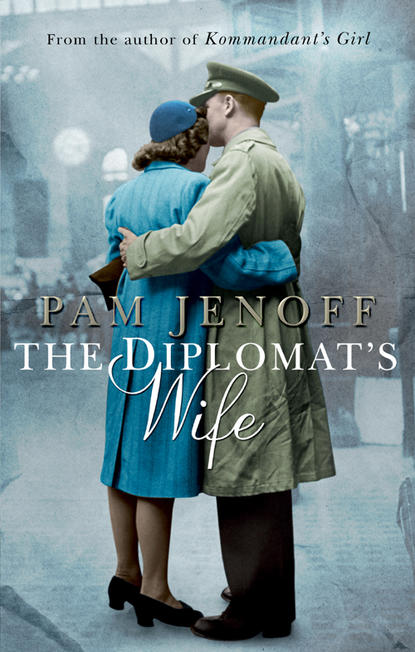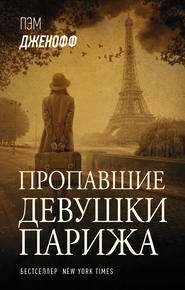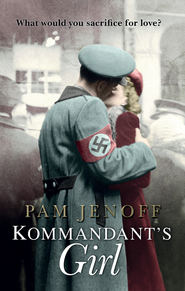По всем вопросам обращайтесь на: info@litportal.ru
(©) 2003-2025.
✖
The Diplomat's Wife
Настройки чтения
Размер шрифта
Высота строк
Поля
I cock my head, puzzled. I did not see any numbers. “I already have a visa,” I say, trying again. “I need an extension.”
“Same line,” the guard replies, pointing once more.
I turn and start back around the corner, my shoulders slumped in disappointment. The line has grown even longer in the minute I was away, two more people joining the queue. I file in behind them quickly. There must be at least a hundred people ahead of me, men and women of every size and age. Some carry babies or hold small children by the hand. If only I had known, I could have waited here all night instead of sleeping by the church.
In the distance a clock chimes nine. Slowly the line begins to shuffle forward. Perhaps this will not be so bad, after all. But then the line comes to a complete stop. Thirty minutes pass, then an hour. I turn and look behind me. At least another twenty people have joined the queue, giving the appearance that it has not shortened at all. We stand motionless for what seems like an eternity, shuffling forward a few meters every half an hour or so. The clock chimes eleven and the sun grows higher in the morning sky, making the air warm and humid.
It is lunchtime, I think a while later, my stomach growling. I have not eaten since finishing the last sandwich the previous evening. The line seems to move more slowly as time passes. People lean against the embassy fence or drop to the pavement and sit in line. I can tell by the weary, accepting expressions on the faces of some of the people around me that they have done this before and are unsurprised by the wait. Anxiety rises in me as the early afternoon passes. What if they do not get to me? I look around, desperately wanting to ask someone if there is a quota, if they take only a certain number of people each day. But I do not know enough French to ask the others in the queue and I cannot leave the line to ask the guard.
Another hour of shuffling and waiting. Finally, I reach the gate and make my way, slowly, painstakingly, up a set of stairs and through a door. Inside, the line snakes through a waiting room. Three glass windows line the far wall, a woman and two men seated behind them. The air here is pungent from too many people in a cramped, warm space. Typewriters clack in the background. I watch as each of the people in front of me in line approaches one of the windows. Some present papers, others simply talk. I cannot hear what they are saying. At the middle window, a woman argues with one of the male clerks for several minutes. When she turns away, I can see that her cheeks are wet.
Finally, it is my turn. “Next,” the woman in the far right window calls. I step forward, my heart pounding. As I reach the window, I take a deep breath, reminding myself that I am supposed to be Rose.
The woman holds out her hand. “Yes?”
Catching my reflection in the glass, I hesitate. My dress is wrinkled, my hair wild from sleeping outside. I should have taken time to freshen up. But it is too late now. I push my papers through the slot at the bottom of the window. “I have a visa to England, but it expired yesterday.” My words, which I practiced on the train, tumble out in a rush, accented and, I fear, nearly unintelligible. “I was not able to get a train out of Salzburg until yesterday and we were detoured to Paris because of broken tracks. So I am unable to make it to England in time. I tried to come yesterday but the embassy was already closed. I was wondering if it would be possible to get an extension.”
The woman scans the papers. “You cannot renew this class of visa here.” Her tone is cold, her French accent thick. “The inviting person must apply for an extension.” She pushes the papers back through the slot at me.
“I have to get to England. Please.”
The woman’s expression remains impassive, as if she hears such things every day. “I’m sorry, but it’s beyond my control.”
“But what am I supposed to do?” My voice rises with panic.
The woman shrugs. “As I said, the only possibility is to get the person who invited you to England to apply for an extension. But you will need to go back to your home country or the country of origin while you wait.”
“Dominique,” a male voice calls from behind the window. “Telephone.” The woman speaks to someone I cannot see in a low voice. Then she turns back to me. “I’m afraid there’s really nothing to be done about it.” Her voice is curt, dismissive. “Good day.”
“But …” I begin. The woman disappears from the window.
I stand before the window for several seconds, not moving. The visa cannot be extended. For a minute, I consider waiting until she returns, but I know that arguing further will be pointless. I turn and push through the crowd of applicants still waiting to be seen and race back down the stairs. When I reach the street I stop, struggling to breathe. Tears fill my eyes, spill over. I can feel the stares of the applicants still waiting in line as I pass, sobbing openly.
At the corner, I cross the boulevard and make my way into the park. I sink to one of the benches by the fountain, still sobbing. My visa was not renewed. I have failed. What am I going to do?
I study the papers still clutched in my hand. The visa is expired, worthless. I start to throw them in the trash bin beside the bench. Then I stop. These are the only papers I have. But the visa will not get me to England. I wonder for a moment if I could stow away. If I cannot get to England, where will I go? I do not have the money to go back to Austria. Looking at the empty bench across from me, I remember the au pairs I’d spoken with the previous day. Perhaps I could stay in Paris, find work taking care of children or cleaning or in a restaurant. But I have no idea if such things are possible without a French visa, without speaking French.
I tuck the papers back in my bag. The contents of the bag—a second dress, some undergarments, a few coins and the papers—are everything I have in the world. No food. I do not even have a place to stay tonight. I look across the park at the church. Maybe if I go there, they will help me. But I know that the caretaker had little more than the wool blanket to offer, and I cannot sleep on the church steps forever.
The Red Cross, I remember. If I can find the Red Cross, I may be able to get food, a place to stay. Perhaps they can even get word to Dava of my plight. The au pairs had pointed me to the American embassy. I turn around. Behind the British flag, an American flag flies high against the blue sky. It is the same as the one that was sewn to Paul’s uniform sleeve, I realize, feeling a small tug at my heart.
I stand up and walk from the park, crossing the street. As I pass the line of applicants still waiting at the British embassy, I keep my head high. But sadness and anger bubble up in me. Would it have cost that clerk anything to bend the rules this one time and extend my visa?
I approach the guard booth at the front of the American embassy. “Consulate is closed, miss.”
I swallow nervously. “I—I was wondering if you could tell me if the Red Cross has a shelter in the city.”
The guard pauses, considering. “I don’t know. Sergeant Smith might, but he’s gone for the day.” My heart sinks. “Why don’t you try asking at the Servicemen’s Hotel. It’s just around the corner.”
“Servicemen’s Hotel.” I repeat the unfamiliar English words. “Thank you.” I start to walk in the direction in which the guard pointed. Around the corner is a tall building, set back from the road. U.S. Armed Servicemen’s Hotel, the sign out front reads. Several soldiers cluster by the entrance, talking and smoking. Seeing their dark green uniforms and close-cut hair, I cannot help but think of Paul. One of the other soldiers mentioned something about Paris, I remember suddenly. In my panic to get the visa extended, I had nearly forgotten. Could he possibly be here? But he was in Salzburg only two days ago, I recall, picturing the lumbering row of trucks as they pulled from the palace grounds. It seems unlikely that he could be here so soon.
Focus on finding the Red Cross, I tell myself. Taking a deep breath, I walk up to the door of the hotel, feeling the eyes of the soldiers on me as I pass. Inside, I hesitate. The lobby is bright, a thick halo of cigarette smoke hovering in the air. Loud voices and music come from a bar off the back of the lobby. I make my way to the reception desk, which sits to the right. “Can I help you, miss?”
“Can you tell me whether the Red Cross has any shelters in the city?”
The clerk pauses, scratching his head. “I think so. Lemme see.” He turns and pulls a thick book from the shelf behind him, then thumbs through the pages. “Here we are—Red Cross. Nearest shelter is at St. Denis du St. Sacrement—that’s a church—in Marais. Go left to the corner and take the number-five bus … here, let me write this down for you.” He pulls out a piece of paper and scribbles something I cannot read, then hands it to me.
“Thank you.” I start to walk away. Then, looking across the lobby at the bar, crowded with soldiers, Paul’s face appears in my mind once more. Easy, I tell myself. Even if Paul was in Paris, there’s no reason to think he would be at this particular hotel. There are thousands of soldiers in the city. He could be anywhere. Impulsively, I turn back toward the desk. “Excuse me again,” I say, then hesitate. “I’m also looking for a soldier named Paul. Paul Mattison.”
The clerk opens a large register that sits on the counter in front of him and scans one page, then another. “Mattison … nope, don’t see no Mattison.”
Of course not. I chastise myself inwardly for my folly. Had I really imagined that Paul might be here? “Thanks again.” I cross the lobby and exit the hotel, feeling foolish.
Outside I start walking toward the bus stop. I pass a café, the tables in its front garden filled with soldiers and civilians, talking merrily over late-afternoon drinks. A delicious aroma of baked goods wafts under my nose. It’s not coming from the café, I realize, but from the small patisserie next door. Curious, I walk closer. A delectable display of pastries sits in the front window, a mountain of chocolate tortes in the center. My mouth waters. I reach into my bag, fingering the money Dava gave me. It would be completely irresponsible to spend some of the little money I have on sweets. And I need to get to the shelter right away. But I walk into the shop, unable to resist.
I point through the glass at the plate of chocolate tortes, then raise my index finger. “S’il vous plait.” I carefully count out the proper amount of coins as the shopkeeper puts a torte in a paper bag and hands it to me. Outside again, I open the bag, inhaling the rich chocolate aroma. Then I pull out the torte, which is still slightly warm. I know that I should go back to the park or at least find somewhere to sit and eat the pastry, but I cannot wait. I take a large bite, closing my eyes as the chocolate flavor washes across my tongue. Eat slowly, I tell myself. Save some for later. But my mouth seems to have a life of its own, devouring the pastry in several large bites. A moment later it is gone.
I stand motionless on the sidewalk, holding the empty bag, overwhelmed by the rush of sweetness. I look at the people sitting at the café adjacent to the patisserie, casually eating cakes like the one I have just devoured. If all of the food in Paris is this good, perhaps I should forget about London and find a way to stay here.
I look back over my shoulder longingly toward the patisserie, wishing that I could spend money on another torte. Suddenly I hear a loud, familiar laugh. My head snaps in the direction of the tables at the café.
Seated at one of the tables, his arm draped around another woman, is Paul.
CHAPTER 8
Paul! Though I had asked about him at the desk, I never really thought … I blink several times, wondering if he is an illusion, expecting him to disappear. But he remains seated at the café table, smiling broadly, eyes wide. It does not seem possible. What is he doing here? Joy surges through me. I take a step forward. Then, focusing on the pretty young woman seated beside him, I stop. Who is she? Anger rises in me as I watch him smile, then say something to the woman. Was his story about shipping out to the Pacific a lie?
I should give him a good piece of my mind, I decide, starting toward him once more. Then, catching a glimpse of my reflection in the patisserie window, I stop again. My plain pink dress, the same one he saw me wearing two days ago, is wrinkled from the long train ride. Dark circles ring my eyes and there are chocolate smudges on my lips. A disheveled Polish country girl. As I look over at the Frenchwoman, with her perfectly coiffed chignon and low-cut silk blouse, my heart crumbles. How could I ever think that Paul really liked me?
I turn blindly away, crashing into a waiter who is carrying a tray between the patisserie and the café. Cups and plates crash noisily to the pavement. “Oh!” My face grows hot as I stand helplessly, staring at the scattered dishes. I feel the scornful eyes of the café patrons upon me as the waiter begins to berate me in French. Desperately, I push past the waiter and race down the sidewalk. A moment later I hear the waiter’s heavy footsteps behind me. I panic. Is he going to try to make me pay for the broken dishes? Has he called the police? I run faster.
“Marta, wait.” Not the waiter, I realize. Paul. He must have seen me when the dishes fell. I keep running, uncertain what to do. But Paul reaches me easily with his long strides, catches my arm. “Marta, please.” I stop, too embarrassed to face him. “Are you okay?” I nod. “I’m so glad, that is, surprised …” He pauses. It is the first time I have heard him at a loss for words. “I mean, what on earth are you doing here?”
“I—I …” I falter, my English failing me. Taking a deep breath, I try again. “I was on my way to London. I had to stop here to try to get my visa extended at the British embassy.”
“What visa?”
I hesitate, looking up. At the sight of him so close, my heart jumps. “Rose’s, actually.”
“I don’t understand….”
“She died, right after you left.”
“Oh, Marta, I’m so sorry.” He moves his hand from my arm to my shoulder, but I pull back. I don’t want his sympathy now.
“She had a visa to London, so Dava arranged to have it transferred to me.”
“And you’re traveling to London all by yourself?” I nod again, unable to bring myself to tell him about my failure to get the visa extension. “We just got into Paris a few hours ago. I haven’t even checked into the hotel yet.” I notice then that he is still wearing the same uniform as in Salzburg, but has added a matching jacket. His hair is freshly combed. In spite of my anger, I grow warm inside. “We’ve been given three days’ leave before shipping out for the Pacific.”














